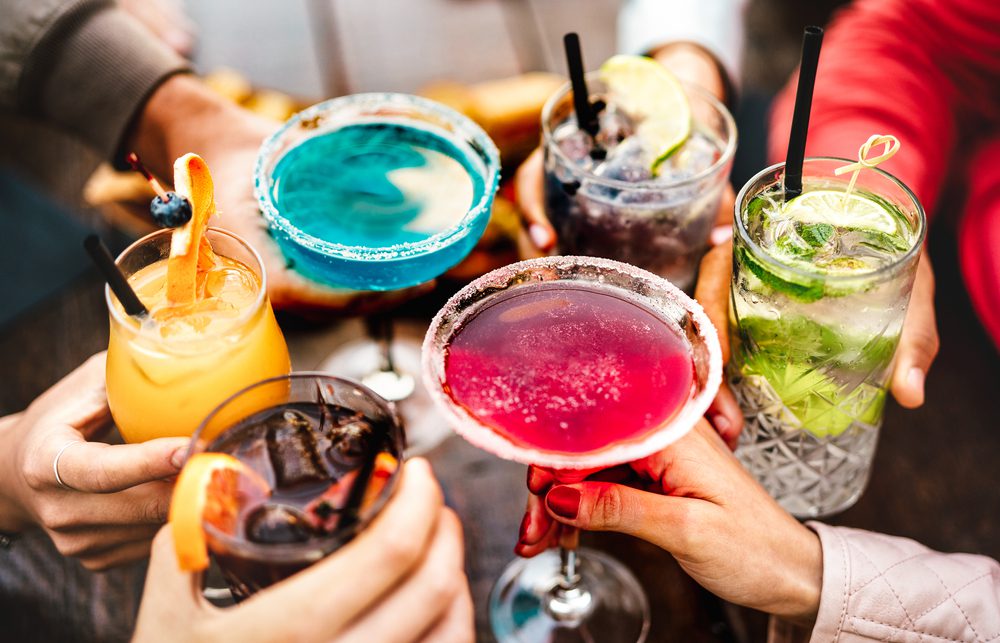From my experience so far, I’ve noticed there are two types of people: those who can go for hours without eating a single food and those whose main hobby is late-night snacking.
If you’re the second type, know that you’re not alone and changing your unhealthy habits is far easier than you think! However, the first thing you must to is to determine the exact reason behind your (seemingly) uncontrollable hunger.
When I first told my mom (who’s a late-night sandwich eater) that there’s an actual reason why she’s feeling hungry at night, and that sometimes this reason may be a medical one, she was in shock. Our bodies always give us clues as to what’s really going on, so all we need to do is to stay informed and listen to ourselves, both physically and emotionally.
Today, some of the top nutrition experts will help us explore 10 popular reasons why you might be feeling hungry all the time, as well as multiple simple solutions for this problem. Some facts can also be found in this interesting book, which you should read if you’re interested in nutrition and stuff like that.
Ready? Let’s have a look:

#1: You’re eating too little protein
Many people think that they should cut protein from their diet to lose weight. In some ways, they’re right, since so many protein sources nowadays are packed in highly processed foods that give you plenty of added sodium, sugars or unhealthy fats.
However, our bodies need protein daily to stay healthy – and this is one of the few nutrients that truly gives us satiety throughout the day. But proteins can also stop you from feeling hungry. All you have to do is pick healthy sources of protein, such as:
- Lean meat (and red meats consumed in moderation)
- Fatty fish (salmon, tuna)
- Eggs
- Dairy products (full-fat milk, Greek yogurt)
- Whole grains, seeds and nuts
If you’re already eating these foods constantly, yet you still feel like you’re always hungry, you might need to give protein powders a shot.
#2: You need more sleep
These days, we live such a busy lifestyle that our mantra could easily be ‘there are not enough hours in a day.’ Aside from the fact that it’s just not true, this lifestyle choice can seriously mess with our health – including our digestion.
In simple terms, your brain needs to rest in order to function properly. When you don’t sleep enough, the signals between your brain and body get mixed up; your ghrelin levels aldo increase drastically, which can make you feel truly hungry when in fact you’re just tired.
This study published in the journal Psychoneuroendocrinology analyzed the physical impact of a sleepless night on 15 healthy adults. Scarily enough, all participants reported being much hungrier than after a night of rest – and the quantity of food they ate increased by 14%.
#3: You’re eating refined carbs too often
Remember when I said that you’re probably eating protein sources that do more harm than good? Well, most of those highly processed meals I hinted towards have dangerous amounts of refined carbs. Refined carbs don’t actually stop you from feeling hungry.
But why are they so bad? Well, there are two reasons: refined carbs have almost no nutrients at all and they give you a spike in blood sugar levels. Whenever you have a blood sugar spike, your insulin levels increase instantly – and when insulin starts releasing all that extra sugar, you get what’s popularly known as a sugar crash. All this harmful process can leave you feeling extremely hungry while increasing your long-term risk for heart disease and cancer.
The easiest way to spot foods rich in refined carbs is to think of those that have white flour: bread, pasta, and baked goods. Note that soda and candy are also dangerously rich in refined carbs, so you should pay attention to them too.
If you’re a bread enthusiast, don’t panic! You don’t have to give up on your favorite food just yet if you know how to spot the healthiest options.
#4: You don’t eat enough fats
Wait, so fat is suddenly a good thing now?! You may be surprised to learn that eating fats can stop you from feeling hungry.
The truth is, fat consumption has always been recommended daily; in fact, this macronutrient is essential to live a long, happy life – and to regulate your meal schedule too. The only trick is that not every type of fat is healthy; as a rule of thumb, monosaturated fats are extremely beneficial while saturated and trans fats can seriously damage your health.
Therefore, if you’re on a low-fat diet or just avoid this nutrient because you think it makes you gain unwanted pounds, just stop right away for you own good.
A study published in the journal Obesity looked at 270 participants diagnosed with obesity. Researchers found that those who had a low-fat diet reported unhealthy cravings much more frequently especially for foods high in sugar. These people were also more likely to feel hungry than those who included fats to their diet.
Some of the healthiest sources of fat are foods that contain medium-chain triglycerides (MCTs) and omega-3 fatty acids, as specialists proved that they can reduce your appetite drastically in a beneficial way. So if you feel like you’re hungry all the time, you may want to include this foods in your diet:
- Coconut and olive oils
- Fatty fish (salmon, tuna)
- Walnuts and flaxseeds
- Avocado
- Eggs and full-fat yogurt
#5: You’re drinking less water than you need
Staying hydrated is crucial for your health for so many reasons, from major organ functionality to digestion and skin. Multiple studies proved that consuming water before each meal can also reduce your appetite and stop you from feeling hungry all the time.
For example, this piece of research from the European Journal of Nutrition surprisingly found that all 14 participants who drank 2 cups of water before each meal ended up consuming 600 fewer calories than the other group who didn’t drink any water.
As a conclusion, if you’re not drinking water before meals (or in general), it might be a solid reason why you’re feeling hungry so often.
While doctors have many recommendations on how much water you should drink daily, the best tip is to simply drink every time you’re thirsty. Keep a bottle of water nearby wherever you go and make a habit of getting a sip every now and then.
Drinking water can also help you lose weight, sometimes even more than you think.

#6: You’re drinking alcohol in excess
Drinking too little water is one thing – but drinking too much alcohol can have a devastating impact on your health and can also make you feel more hungry.
In our case, alcohol consumption can stop the production of hormones responsible for reducing your appetite (such as leptin). This fact has been long proven by multiple studies including one from the journal Physiology & Behavior, which established that alcohol can be a risk factor for obesity.
Another study performed on 26 healthy participants found that those who drank only one 30 milliliter-ounce of alcohol before meals ate 30% more calories compared to those who avoided alcohol. Why? Because alcohol can make you hungry! Judging by this piece of research, you can only imagine the devastating impact of making a habit out of drinking alcoholic beverages daily.
I’m not saying you should cut alcohol from your diet completely if you’re a fan – just make sure that you stick to the recommended intake of one drink for women and two drinks for men. Wine can be an excellent choice because it benefits your heart health and it comes in such a wide range of flavors.
#7: You’re way too stressed
I’ve said it before and I’ll say it again: stress is one of the biggest risk factors we experience in the 21st century.
The main reason of concern in this case is that stress increases your levels of cortisol. This hormone is mainly responsible for increasing your appetite and especially cravings for unhealthy foods. In simple terms, the more stressed you are, the more likely is for you to feel hungry all the time – to the point it becomes uncontrollable.
A study analyzed how stress impacts 59 women’s eating patterns and the results were staggering: almost all stressed participants ate more calories during the day and many of them were sweet foods such as desserts, as opposed to those who weren’t stressed at all.
#8: You have an underlying illness
Most of the times, excessive hunger is due to external factors like stress or a poor lifestyle habit such as alcohol consumption.
However, if you’ve done everything you could and you’re still uncontrollably hungry, you might want to have a specialist look into your health state. Here are a few of the most common underlying illnesses that make you eat too much:
Hyperthyroidism. This condition is caused by an overactivity of your thyroid gland and might make you feel like you’re hungry all the time.
Hypoglycemia. Whenever your blood sugar levels drop, your hunger increases big time. This phenomenon also happens when you haven’t eaten for a longer time or if your diet is unusually high in sugar and carbs.
Type 2 diabetes. Since diabetes affects your insulin production, it also has a direct impact on the hormones responsible for hunger and satiety.
If you notice anything unusual about yourself, contact the doctor as soon as possible to make sure everything is alright; after all, prevention is much easier than treatment, right?
#9: You’re eating too fast
If you’re a fast eater, this might be one of the top reasons why you’re feeling so hungry – and it’s all perfectly logical.
When you eat too fast, you’re also chewing too little; this alters the normal digestion process and doesn’t give your body enough time to evaluate the food intake and say ‘stop now.’ One of the ways your body tells you to stop eating is by releasing so-called ‘fullness hormones’ – but if you’re eating too fast, your system just doesn’t have time to produce those hormones, thus making you ingest more calories than needed. Basically, you’ll end up feeling hungry even if you ate a large pizza.
For example, a study Journal of the American Dietetic Association found that fast eaters end up eating 10% more calories at each meal compared to those who eat slowly.
Eating slowly is equally important for the digestion process, as it prevents unpleasant post-meal symptoms such as bloating or stomach cramps.

#10: You drink too many calories
Is it possible to get more than your daily recommended intake of calories through beverages alone?
Absolutely.
Whether we talk about sodas (zero sugar ones included!), ready-made meal replacement shakes or any coffee varieties (think Starbucks), these drinks can give you a huge spike in blood sugar levels along with plenty of empty calories.
The problem with this habit is that drinking takes much less time than eating. This has a similar effect to fast eating, as your body can’t send you the right signals to stop drinking until it’s too late.
Ironically enough, even if you’re drinking a 400 ml meal replacement shake, for example, you’ll still feel hungry very quickly if it’s a highly processed beverage. This vicious cycle only leads to more eating and unhealthy cravings that damage your diet daily.
A study from the American Journal of Clinical Nutrition proved that people who consumed liquid snacks were feeling hungrier than those who didn’t and they also ate 400 more calories during the day.
Of course, I’m not saying liquid snacks are bad – in fact, I’m all in for healthy smoothies and soups. The best way to get the best of any liquid beverage is to just prepare them right at home using healthy ingredients to avoid added sugars and other chemicals.
#11: You’re taking some medication
Certain types of medication can make you feel hungry, which isn’t necessarily a bad thing if you know how to manage your meal choices properly.
Some of the most common medications that have this impact are antidepressants, mood stabilizers and anti-seizure drugs. In isolated cases, insulin recommended for diabetes can also increase your hunger throughout the day.
Many women are also reporting that they feel like they are always hungry after starting to take birth control pills, although there’s not enough research to confirm the theory.
If you’re onto some form of medication and you suspect that it makes you hungrier, the wisest choice is to simply tell your doctor. If they can’t recommend a different treatment, they may help you create a healthy eating schedule to avoid overeating and unwanted weight gain.
You may also want to read 9 Surprisingly Good Uses For Salt.













